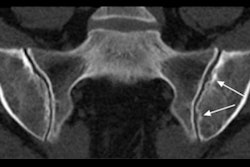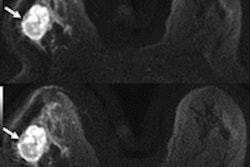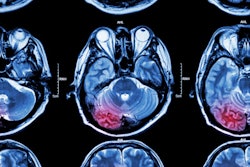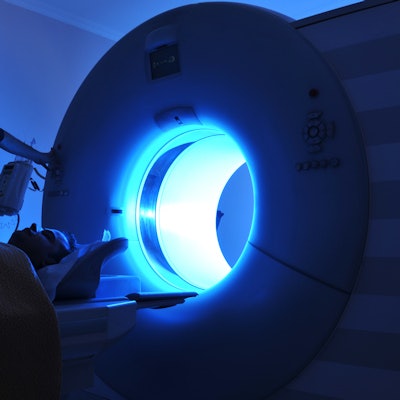
Diffusion-weighted MR imaging (DWI-MRI) has proven accuracy in diagnosing and evaluating children with suspected arthritis and can help clinicians avoid the use of gadolinium-based contrast agents (GBCAs), according to a study published March 10 in Radiology.
Sensitivity with DWI topped 90% and specificity exceeded 80% among pediatric participants suspected to have juvenile idiopathic arthritis (JIA). DWI also registered a false-positive rate of only 2%. In addition, DWI matched the high level of diagnoses with contrast-enhanced MRI in synovial inflammation of the knee.
"The results indicate that DWI could replace contrast-enhanced MRI for imaging of synovial inflammation in this patient group," wrote the authors, led by Dr. Anouk Barendregt from Amsterdam University Medical Center.
Children with juvenile idiopathic arthritis also often have an inflamed synovial membrane in the knee, which causes joint pain, stiffness, dysfunction, and decreased quality of life. While the use of MRI is still on the clinical periphery for diagnosing this condition, the modality is expected to gain traction, given that contrast-enhanced MRI is a reliable option for synovial inflammation.
"Unfortunately, the widespread use of contrast-enhanced MRI in children with JIA is impeded by several factors: long imaging duration; high costs; invasiveness of cannula placement; and contrast material administration, which can lead to allergic reactions, nephrogenic systemic fibrosis, and gadolinium depositions in the brain," the authors noted. "Because of these concerns, quicker, cheaper, and noninvasive contrast material-free MRI approaches should be considered."
DWI could solve those issues, since it does not require contrast and has shown that it can assess the synovial membrane based on the diffusion of water molecules. Hence, Barendregt and colleagues sought to evaluate DWI's diagnostic performance in detecting arthritis and synovial inflammation against contrast-enhanced MRI.
The researchers prospectively analyzed 45 patients (median age, 14 years) with symptoms or suspected juvenile idiopathic arthritis in the knee between December 2015 and December 2018. The 38 girls and seven boys underwent 3-tesla MRI scans (Ingenia, Philips Healthcare) with early postcontrast imaging sequences less than seven minutes after injection of 0.1 mg/kg of gadobutrol contrast (Gadavist, Bayer HealthCare) for acquisition of axial DWI turbo spin-echo images.
MR images were anonymized and randomized and interpreted by two readers blinded to all clinical data. Their evaluations served as the reference standard in which they found arthritis in 14 children (31%) and no arthritis in 31 children (69%). Based on those diagnoses, DWI confirmed 13 of the 14 arthritis cases for a sensitivity of 93% and 25 cases with no arthritis for a specificity of 81%. Diagnostic confidence between the two readers had a median score of 99.
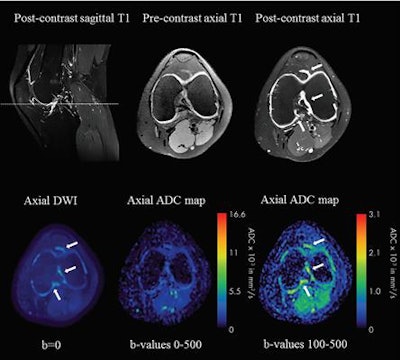 MR images are from a 17-year-old girl with polyarticular rheumatoid juvenile idiopathic arthritis and mild synovial inflammation. The score from the DWI dataset agreed with the reference standard that arthritis was present in this knee. Arrows indicate areas of synovial inflammation. ADC = apparent diffusion coefficient. Images courtesy of Radiology.
MR images are from a 17-year-old girl with polyarticular rheumatoid juvenile idiopathic arthritis and mild synovial inflammation. The score from the DWI dataset agreed with the reference standard that arthritis was present in this knee. Arrows indicate areas of synovial inflammation. ADC = apparent diffusion coefficient. Images courtesy of Radiology.When the researchers compared synovial inflammation detection between DWI contrast-enhanced MRI, regardless of the reference standard, the two approaches agreed in 37 of the cases (82%), resulting in a sensitivity of 92% and a specificity of 78%
"Diffusion-weighted imaging (DWI) is accurate in detecting arthritis in pediatric participants with juvenile idiopathic arthritis (JIA) or those suspected of having JIA and shows agreement with contrast-enhanced MRI," Barendregt and colleagues wrote. "Our results indicate that DWI could replace contrast-enhanced MRI for imaging of synovial inflammation in this patient group."




